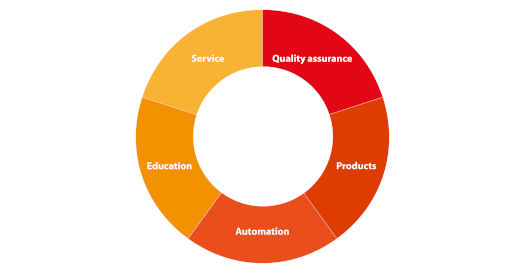EN 1090
Since July 1, 2014, the standard EN 1090 is legally in force. This means that it is mandatory for both steel and aluminum structures and their components to be CE marked. A CE marking is a statement by the manufacturer that the products meet all the structural requirements of the corresponding product standard(s). The CE marking indicates that the product complies with the applicable EC directives.
Three parts of the EN 1090
- EN 1090-01 is the European Directive for the construction of steel and aluminum products. It describes the conditions that a quality system of a production process must meet in order to achieve CE marking. For the technical requirements, EN 1090-01 refers to the other two parts.
- EN 1090-02 relates to steel structures.
- EN 1090-03 relates to aluminum structures.
In the EN 1090-2, EXC (execution classes) are indicated. Constructions must be classified beforehand in an execution class which can vary from EXC1 to EXC4. The higher the class, the higher the technical requirements. This also has consequences for the welding process, with large differences between the execution classes, for example the level of the welding coordinator.
With the entry into force of EN 1090-1, it is mandatory to set up an FPC (Factory Production Control). This is a quality system which is assessed in accordance with EN 1090-1. The introduction of FPC means the introduction of a (quality) manual in which matters such as responsibilities and existing production processes are recorded in writing. Among other things, the role of the welding coordinator and the associated tasks and responsibilities must be described in this manual. Also, the periodic inspection of tools and welding equipment should be laid down in a procedure.
For welding technology, EN 1090 refers to ISO 3834.

Distribution EN 1090-2 and EN-ISO 3834 in table
| EN 1090-2 | EN-ISO 3834 |
| EN-ISO 3834-1 General section |
|
| EXC 1 Houses, agricultural buildings storage sheds. |
EN-ISO 3834-4 Basic quality requirements |
| EXC 2 ** Buildings general |
EN-ISO 3834-3 standard quality requirements |
| EXC 3 * Major risks / fatigue |
EN-ISO 3834-2 Extensive quality requirements |
| EXC 4 * Nuclear power plants, extremely large stadiums, bridges |
EN-ISO 3834-2 Extensive quality requirements |
** Most selected level.
What is the role of the welding coordinator when working according to EN-ISO 3834?
- From execution stages 2, 3 and 4 onwards, it is mandatory to appoint a welding coordinator.
- Tasks and responsibilities are defined in EN-ISO 14731.
- Preparation, coordination, monitoring and final control of the production are the responsibility of the welding coordinator.
- The welding coordinator's tasks must be laid down in a quality system, for example, the supervision of welding qualifications and approval of welding tests.
- For welding coordinator of execution class 2, a welding coordinator course is sufficient.
- For welding coordinator execution class 3 and 4, a level of IWS (International Welding Specialist) IWT (International Welding Technologist), IWE (International Welding Engineer) is recommended.
EN 1090 cases in a row
- Rules for the manufacture and trade of steel and aluminum structures and their components.
- CE marking mandatory since 01-07-2014.
- Harmonized standard - end of separate rules - start of free trade within the EU.
- Consequences for organizations within the steel and aluminum industry.
- Constructions are classified in advance in an EXC (execution class) (EXC 1 to EXC 4).
- The higher the class, the higher the technical requirements.
- For welding technology, EN 1090 refers to the ISO 3834.
- EN-ISO 3834 is a welding qualification system with which an organization can demonstrate that it guarantees the quality requirements for welding activities.
- Are you working under EN 1090-2? Then you must meet the quality requirements of the ISO 3834.
- EN 1090-1 FPC system, including the welding quality management system according to NEN-EN ISO 3834, must be certified.
- Certification FPC by an external notified body (NoBo).

Our overall approach
